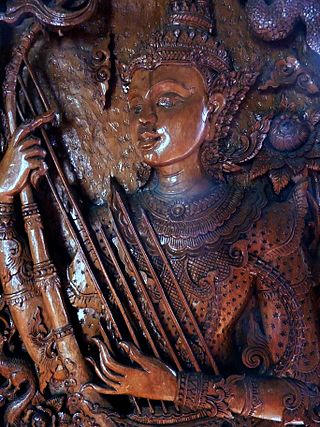
A gandharva is a member of a class of celestial beings in Indian religions, such as Hinduism, Buddhism, and Jainism, whose males are divine performers such as musicians and singers, and the females are divine dancers. In Hinduism, they are regarded to be the celestial demigods who serve as the musicians of the devas.

Rākshasa are a race of usually malevolent beings prominently featured in Hinduism, Buddhism, Jainism and Folk Islam. They reside on Earth but possess supernatural powers, which they usually use for evil acts such as disrupting Vedic sacrifices or eating humans.

Kubera also known as Kuvera, Kuber and Kuberan, is the god of wealth, and the god-king of the semi-divine yakshas in Hinduism. He is regarded as the regent of the north (Dikpala), and a protector of the world (Lokapala). His many epithets extol him as the overlord of numerous semi-divine species, and the owner of the treasures of the world. Kubera is often depicted with a plump body, adorned with jewels, and carrying a money-pot and a club.

Vaiśravaṇa or Vessavaṇa, is one of the Four Heavenly Kings, and is considered an important figure in Buddhism. He is the god of warfare and usually portrayed as a warrior-king.
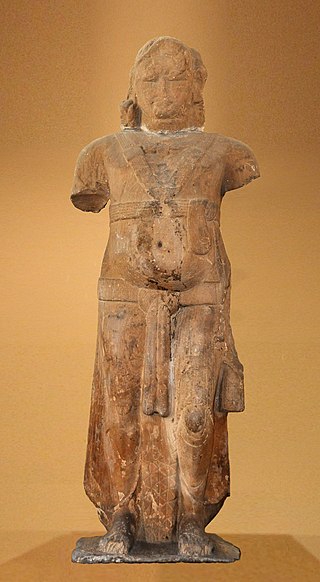
The Yakshas are a broad class of nature spirits, usually benevolent, but sometimes mischievous or capricious, connected with water, fertility, trees, the forest, treasure and wilderness. They appear in Hindu, Jain and Buddhist texts, as well as ancient and medieval era temples of South Asia and Southeast Asia as guardian deities. The feminine form of the word is IAST: Yakṣī or Yakshini.

Sahadeva was the youngest of the five Pandava brothers in the ancient Indian epic, the Mahabharata. He and his twin brother Nakula were the sons of Madri, one of the wives of the Pandava patriarch Pandu, and Ashvini Kumaras, the divine twin physicians of the gods, whom she invoked to beget her sons due to Pandu's inability to progenate. Kunti, Sahadeva's step-mother, loved him the most despite his birth to Madri. Sahadeva is renowned for his wisdom, knowledge of astrology, and skill in swordsmanship.
Alaka, also called Alakapuri or Alkavati, is a city featured in Hinduism. It is the home of Kubera, the king of a race called the yakshas and the god of wealth. The Mahabharata mentions this city as the capital of the yaksha Kingdom. This city is said to rival Amaravati, the capital of Indra, the king of the devas, in its architecture, opulence, and overall splendour. It is quoted in the Sanskrit lyrical poem Meghadūta by Kalidasa.
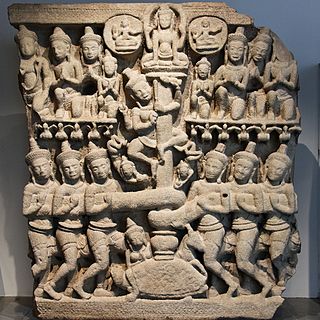
Hindu mythological wars are the wars described in the Hindu texts of ancient India. These wars depicted both mortals of great prowess as well as deities and supernatural beings, often wielding supernatural weapons of great power. Hindu teachings prescribe war as the final option, to be employed only after all peaceful methods are exhausted. Participation in righteous war, or dharmayuddha, was said to be honourable and was a principal duty of the Kshatriya or the warrior varna, and victory in such wars was regarded as a matter of honour.
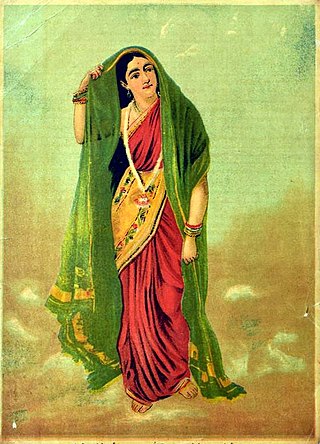
Rambha is one of the prominent apsaras, the celestial nymphs of Svarga, in Hindu mythology. She is extolled to be unrivalled in her accomplishments in the arts of dancing, music, and beauty.
Kimpurusha kingdom refers to the territory of a tribe called Kimpurushas who were one among the exotic tribes of ancient India. These exotic tribes lived in inaccessible regions like the Himalaya mountains.
Rakshasa kingdom refers to the territory of Rakshasas who were a tribe, mentioned along with others like Devas, Asuras, Pisachas, Gandharvas, Kimpurushas, Vanaras, Suparnas, Kinnaras, Bhutas and Yakshas. Rakshasas were described to have large bodies, probably due to their continuous life in cold climates over snow-covered mountains. The forefathers of the famous Rakshasa king Ravana lived along with the Yakshas. The Yaksha king Kubera was the elder brother of Rakshasa king Ravana. Ravana had many sons among Gandharva wives. The two epics Mahabharata and Ramayana and many Puranas attest that Rakshasas, Yakshas and Gandharvas were related and had inter-marriages.

Kirata kingdom in Sanskrit literature and Hindu mythology refers to any kingdom of the Kiratis, who were dwellers mostly in the Himalayas. They took part in the Kurukshetra War along with Parvatas (mountaineers) and other Himalayan tribes.
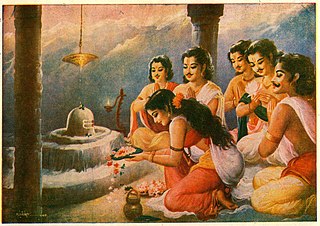
The Vana Parva, also known as the "Book of the Forest", is the third of eighteen parvas in the Indian epic Mahabharata. Vana Parva traditionally has 21 parts and 324 chapters. The critical edition of Vana Parva is the longest of the 18 books in the epic, containing 16 parts and 299 chapters.

Tumburu is the foremost among the gandharvas, the celestial musicians of Hindu mythology. Accounts depict him performing in the courts of the deities Kubera and Indra, and as singing the praises of Vishnu. He is said to lead the gandharvas in their singing.

Maṇibhadra is one of the major yakshas. He was a popular deity in ancient India.
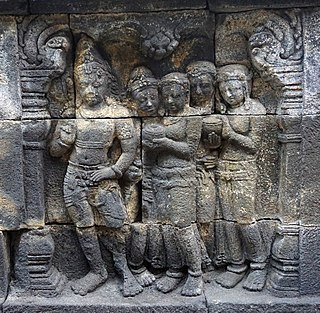
Amaravati is the capital city of Svarga, the realm of Indra, the king of the devas, in Hinduism, Buddhism, and Jainism. It is also called Devapura, ‘city of the devas’ and Pūṣābhāsā, ‘sun-splendour’ in the Puranas.












